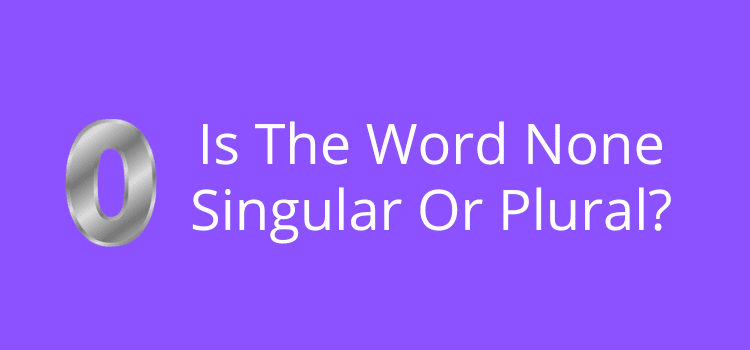
We use the word none in writing to indicate the absence or lack of something, but its grammatical usage can be a little tricky. Whether none is a singular or plural pronoun is a very common question for writers.
The uncertainty arises because English grammar doesn’t always provide clear-cut rules, and none is a perfect example of this ambiguity.
The truth is, none can function as both a singular and plural pronoun, and the key to using it correctly lies in considering the context in which it appears.
Whether none takes a plural or singular verb depends on the specific meaning the writer or speaker intends to convey, as well as the noun or nouns it refers to.
When is none singular or plural?
With countable nouns, none is a grammar point that is always open to interpretation.
If we use none to mean not one or no one, it is a singular pronoun and usually takes a singular verb.
For example, none of his solutions is practical.
In this sentence, none means not one of his solutions is practical.
So, in this case, it requires a singular verb because it’s a singular pronoun.
On the other hand, when none means not any of, it becomes a plural pronoun and takes a plural verb.
For example, none of his solutions are practical.
In this sentence, none means not any of his solutions are practical.
Therefore, it is a plural pronoun with a plural verb.
In most cases, your decision about pronoun and verb agreement will depend on whether none means not one, no one, or not any.
None with uncountable nouns
Luckily, you almost always use a singular verb when you use none with uncountable nouns. In this case, it’s because none always means not any or not any of.
We still can’t use the road because none of the snow has melted.
None of the fruit I bought this morning is ripe enough to eat.
The only time it gets a bit tricky is with uncountable collective nouns that can be divided into parts.
These include nouns like team, class, family, and staff.
Then none can mean not any or not one.
After the layoffs, none of the catering staff is left.
After the layoffs, none of the catering staff are left.
However, in general, singular verb use is probably more common.
When is none always plural?
You use a plural verb whenever you refer to a previous number of people or items.
Logically, these will be countable nouns.
Five people applied for the CEO position, but none were suitably qualified.
I bought three shirts on special for my son, and none are his size.
This is possibly the only instance where your choice of verb is easy.
Using synesis gives you a choice
According to Merriam-Webster, synesis is a grammatical construction in which agreement or reference is according to sense rather than strict syntax.
In other words, you can choose to use a singular or plural verb by meaning and not by strict grammatical form.
None of the bananas is ripe.
None of the bananas are ripe.
None of them is up to the task.
None of them are up to the task.
All four sentences above are grammatically correct.
However, using a plural verb may read more naturally, so it’s perhaps the better choice.
Other uses
Apart from being a pronoun, none can also be an adverb.
We often use it to modify comparative adjectives, such as worse or better, to say that something is not any worse or better than before.
We lost our dog, but he arrived back home after a couple of days, none the worse for wear.
As for authors, for me, there was none better than Douglas Adams.
There are also many fixed expressions and phrases that we often use.
We had a surprise guest for dinner. It was none other than our local MP.
I used my brother’s phone to make a couple of calls, but he was none the wiser.
After the robbery, the police arrived none too soon.
My boss asked me a personal question, and I told him it was none of his business.
Conclusion
Whenever I use the word none in writing, I’m always careful.
It’s one of the few grammar points with no right or wrong answer.
However, some readers might have a fixed opinion about what is appropriate.
I suppose I lean toward using a plural verb more often than not.
Not because it is necessarily correct, but because it sometimes reads and sounds better.
It always depends on what you mean by none.
If it is not any of, then you can’t really go wrong using a plural verb.
But if you mean not one or no one, which are both singular in meaning, then you need a singular verb in most cases.
Related Reading: Gapping In Grammar And How To Use It



